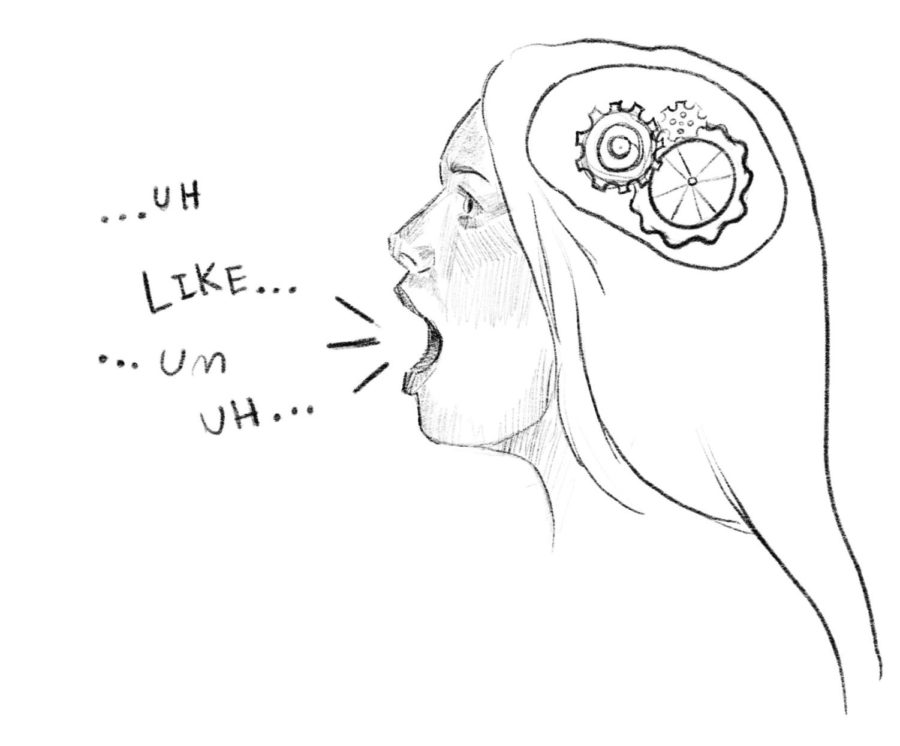Filler Words Aren’t Always a Bad Thing
Evaluating when and why I use filler words allowed me to realize that when I say the words “like”, “um”, etc. I am not thinking these words, the gears in my head are turning as I am forming my next thoughts. Staff Illustration: Dorinda Xiao.
January 20, 2022
Yesterday I texted a friend asking to hang out: “Hey, do you want to like go to dinner this weekend?” I spent a few seconds debating whether I should use the word “like” in my text. I know that it’s unnecessary and not grammatically correct to purposefully use this word when sending a text that I’ve had time to think through, but using “like” made the text seem less forward, more informal and carefree.
This wasn’t the first time I had noticed my consistent use of the word “like.” I use “like” and other filler words all the time as buffers when I’m struggling for words or nervous. Often, I use these words as a cushion from being wrong or rejected.
Sometimes I use filler words as a way to signal that I’m okay with a response or an opposing view. “A filler word could be a question to open up a thought and allow it to be tempered by the possibility of its own contradiction,” English teacher Rachel Blumenthal said. “Now you have me thinking that filler words are actually an invitation for alternative perspectives.” Blumenthal toyed with the idea that filler words could be seen as a sign of listening.
Other times I use filler words because I’m scared of my own opinion and scared of how people might react to it. Melissa Lozada-Oliva wrote a poem called “Like, Totally Whatever” in response to Taylor Mali’s “Totally, Like Whatever” that challenged his harsh criticism of this generation’s lack of conviction due to filler words. “Maybe everything girls do is the evolution of defense mechanisms,” Lozada-Oliva said. “Our like’s are our knee pads, our um’s are the knives we tuck into our boots at night, our you know’s are the best friends we call when walking down a dark alley.”
As a teenage girl living in a progressive generation, I want to create change; I want to stand up for what is right and advocate for my own beliefs. But that does not mean I am not scared of change. I am scared because of the very things I want to reform. I want nothing more than to progress from the previous generation to right their wrongs, but I also want them to be proud of me, of us. Filler words allow me to express my wishes to older generations in instances where I’m scared to disappoint or upset them.
Filler words are also a way to signal that I am developing a thought and do not want to be interrupted. I have noticed that when I am saying “like,” “um,” or repeating phrases, these words aren’t playing in my head. Instead, the gears in my head are spinning as I say these fillers — thinking of the best way to convey my message, thinking of the best word selection, thinking of how I can make sure that no one misinterprets my words.
The search for a word or phrase can occur when one is thinking of an infrequent word or when one is attempting to keep their speech fluent while their attention is elsewhere, according to a research report: “Exploring Filler Words and Their Impact”.
Speaking eloquently is seen to many as a sign of intelligence. Nearly everyone I know (including me) says “like,” “um” and “you know” countless times during a conversation. But these same friends will get A’s and perfect scores on their English papers and history essays.
Filled pauses and filler words are not seen as a weakness to linguists but rather a sign of awareness and conscientiousness, according to an Independent article.
There is a difference between deep thought during impromptu discourse and pre-meditated conversations or discussion points, such as in an interview. When I am warned that I should not use filler words or any other acts of disfluency, I am often reminded that using them in an interview or speech will affect my outcome.
I agree that, when I am in an interview, I should speak with as much fluency and conviction as I can. The same goes for a speech or presentation. Sending messages in these mediums is for the purpose of advocating for initiatives, showcasing your knowledge or work, etc. when one should be professional and polished. However, if I am using filler words to give myself time to develop my deep thoughts and create more fruitful discourse and debate for my peers and me, then why is it seen as a bad thing?
I believe that filler words during forensic speech, interviews and other interactions where we prepare ourselves should be pointed out in a respectful way that allows us to eliminate these words in the future. When time has been given to prepare points, filler words can expose a lack of preparation, and therefore it is understandable that audiences might interpret these words as negative. However, I also believe that we must address the benefits behind using filled pauses or using “like” or “um” in order to push our thoughts and progress in our learning. This is a habit that I for one have found hard to ditch, but could possibly do so in the future by saying, “give me a moment to get my thoughts together,” or holding up a hand to show that I have paused rather than stopped.
There is a small chance that everyone in the world will stop using filler words in all instances, but to even come close to eliminating filler words from all facets of speech, we must understand when and why we use them.




